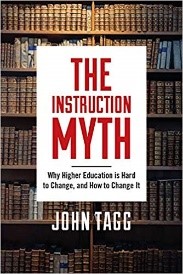 One of my favorite books on higher education is John Tagg’s The Learning Paradigm College. In 1995, Tagg co-authored an article with Robert B. Barr titled “From teaching to learning—a new paradigm for undergraduate education,” which has become one of the most-cited articles of the past 20 years. On April 5, Rutgers University Press will release a new book by this provocative author titled The Instruction Myth: Why Higher Education is Hard to Change, and How to Change It. In this 342-page book, Tagg continues to challenge universities to shift from their central operating principle that education revolves around instruction to a more powerful and effective focus on student learning. Although decades of research have revealed the key contributors to student learning, few universities have implemented those suggestions; consequently, the quality of higher education continues to disappoint. In nine chapters, Tagg explains why change is so hard in higher education, and then in nine more chapters, he proposes ways to implement radical change. Tagg is professor emeritus at Palomar College in San Marcos, CA. The book can be pre-ordered on Amazon for $34.95. The Kindle version is available for $33.20.
One of my favorite books on higher education is John Tagg’s The Learning Paradigm College. In 1995, Tagg co-authored an article with Robert B. Barr titled “From teaching to learning—a new paradigm for undergraduate education,” which has become one of the most-cited articles of the past 20 years. On April 5, Rutgers University Press will release a new book by this provocative author titled The Instruction Myth: Why Higher Education is Hard to Change, and How to Change It. In this 342-page book, Tagg continues to challenge universities to shift from their central operating principle that education revolves around instruction to a more powerful and effective focus on student learning. Although decades of research have revealed the key contributors to student learning, few universities have implemented those suggestions; consequently, the quality of higher education continues to disappoint. In nine chapters, Tagg explains why change is so hard in higher education, and then in nine more chapters, he proposes ways to implement radical change. Tagg is professor emeritus at Palomar College in San Marcos, CA. The book can be pre-ordered on Amazon for $34.95. The Kindle version is available for $33.20.
Posted by: Gregory Linton | 04/04/2019
Higher Ed Resource of the Week: The Instruction Myth: Why Higher Education Is Hard to Change, and How to Change It
Categories
- Higher education
- Pedagogy
- Academic dishonesty
- Accessibility
- Biblical higher education
- Christian education
- Clickers
- Cognitive load theory
- Cognitive science
- Coherence
- Community of practice
- Core competencies
- creativity
- Critical thinking
- Curriculum design
- Deep learning
- Faculty development
- Faculty learning community
- Faculty-student relationship
- First-generation Students
- First-year experience
- General education
- Grade inflation
- Grading
- Graduation rate
- Inclusive Classrooms
- Instructional design
- Intensive courses
- Learning organization
- Lectures
- Mathematics
- Multiculturalism
- neuroscience of learning
- Note taking
- OER
- Online teaching
- Plagiarism
- Problem Solving
- Quantitative literacy
- Relevance
- Scholarship of teaching & learning
- Soft skills
- Student cheating
- Student learning outcomes
- Student response system
- Student retention
- Teaching strategies
- Techology
- Universal design for learning
- Video games
- Writing instruction
- Policy
- Academic administration
- Academic planning
- Assessment of learning
- Benefits of college
- College rankings
- College readiness
- Course evaluations
- Course scheduling
- Curriculum requirements
- Demographics
- Enrollment management
- Finances
- Gender gap
- Higher ed reform
- History of higher ed
- Honor codes
- Innovation
- Institutional advancement
- Liberal arts
- Male students
- Nontraditional students
- Online education
- Retention
- Skills gap
- Student evaluations of teaching
- Student mental health
- Student mobility
- trends
- Workforce readiness
Leave a comment